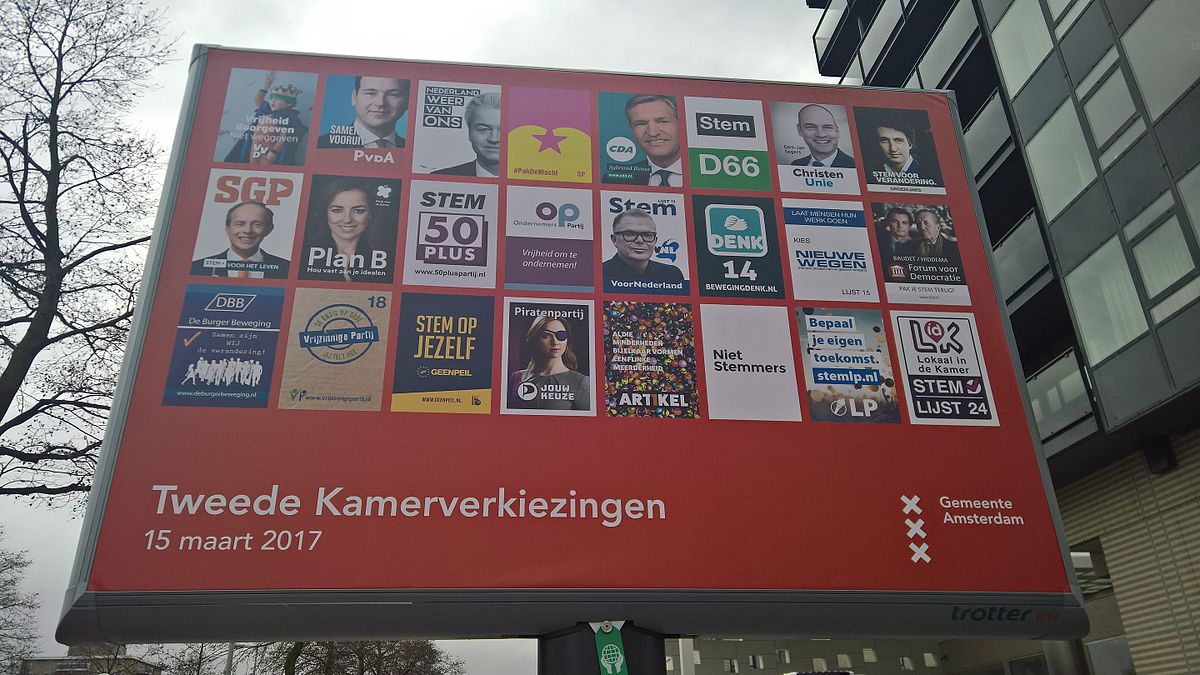Netherlands: Elections in a shattered European landscape
Europe is in political and social turmoil.
There are many reasons for this situation, such as the constant threat of terrorism, the influx of refugees from the Middle East and Africa, the lack of cohesion and agreement between the EU member states, the weakness of the euro, the ‘Brexit’, the political aggression of Russia and Turkey, and the general discontent among the European population about their politicians and the poor functioning of local and European democracy.
Add to this the recent uncertainty about American politics, including the strong warning of President Trump that the European members of NATO should do considerably more to strengthen their defense (a message that was welcomed by many Europeans), and the result is a highly uncertain and explosive political-social mix.
It is in this shattered landscape that three important members of the EU and NATO will soon have general elections: in the Netherlands on March 15; in France during April and May, and in Germany in September. So no wonder that the international media are now flocking into The Hague, the seat of Dutch government, to watch what will happen there this week, because the Dutch elections are seen as an important indicator of the course that Europe will take the coming years.
The Dutch love to have a choice, so it is not amazing that no less than 27 political parties have registered for the coming elections. These include the traditional right-wing parties of liberals (in three varieties), left wing social-democrats (also in three varieties) and christian-democrats (in four varieties). Plus a bewildering selection of old and new smaller parties, often devoted to a limited number of issues or a smaller selection of the electorate. Like the Citizens Movement, the Entrepreneurs Party, the Animal Party (pro animal rights and against the bio-industry), the 50+ party for senior citizens, and ‘Think’, a split-off from the Labor Party, that hopes to represent the divided Dutch-Turkish community of 400.000 people (on a population of 17 million).
The past years the Dutch political debate was dominated by Geert Wilders of the Freedom Party, who has strong anti-islamic and anti-EU standpoints. According to recent polls his party could become the largest of all, with some 20-25 seats in the 150 seat Dutch parliament, so a very long way from a majority. Besides, several of the other larger parties have already vetoed any cooperation with Mr. Wilders, so his chances of ever forming a majority coalition are practically nil.
The present Dutch government was formed four years ago by a coalition of the right-wing Liberal Party and the left-wing Labor Party, whose will for power was considerably larger than their common sense. This unlikely coalition has succeeded in making itself unpopular, and there is no chance that they will keep their narrow majority in parliament. According to recent polls the Liberal Party, led by the ever optimistic and smiling Prime Minister Mark Rutte, will lose some 15 of its 40 seats, and the Labor Party, led by the uninspiring vice-Prime Minister Lodewijk Asscher, may be very glad if they can keep 15 seats of their present 35. Mark Rutte can now only hope to beat Geert Wilders in the race for the largest electorate, but a very close outcome is expected.
Runners up for power are the Chistian Democrats, who are doing surprisingly well with an expected 20 or more seats (now 13) and the leftish liberals of D66 (up to 17 from the present 12). A huge surprise is the revival of the ‘Green Left’ party under the new leadership of the young (30) and charismatic Jesse Klaver, who is mockingly called ‘the Jessaias’ by his admirers and opponents. From the present four seats in parliament the ‘Green Left’ may climb to an unexpected 15 or even 20 seats.
All recent polls indicate that a coalition of at least four or five parties will be needed for a stable majority in Dutch parliament. So the formation of a new government will be a lengthy and tough job that will unavoidably kill many expectations and promises.
However, the outcome of the Dutch elections with so many different parties, will also indicate the feelings and sentiments inside the multi-cultural Dutch society, which may be a good forecast of what is coming up for Europe as a whole.

René van Slooten is a leading ‘Poe researcher’, who theorizes that Poe’s final treatise, ‘Eureka’, a response to the philosophical and religious questions of his time, was a forerunner to Einstein’s theory of relativity. He was born in 1944 in The Netherlands. He studied chemical engineering and science history and worked in the food industry in Europe, Africa and Asia.The past years he works in the production of bio-fuels from organic waste materials, especially in developing countries. His interest in Edgar Allan Poe’s ‘Eureka’ started in 1982, when he found an antiquarian edition and read the scientific and philosophical ideas that were unheard of in 1848. He became a member of the international ‘Edgar Allan Poe Studies Association’ and his first article about ‘Eureka’ appeared in 1986 in a major Dutch magazine. Since then he published numerous articles, essays and letters on Poe and ‘Eureka’ in Dutch magazines and newspapers, but also in the international magazines ‘Nature’, ‘NewScientist’ and TIME. He published the first Dutch ‘Eureka’ translation (2003) and presented two papers on ‘Eureka’ at the international Poe conferences in Baltimore (2002) and Philadelphia (2010). His main interest in ‘Eureka’ is its history and acceptance in Europe and its influence on philosophy and science during the late 19th and early 20th centuries.

